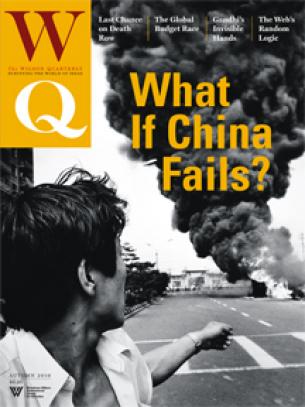What If China Fails?

It seems almost inconceivable that Asia’s rising giant could stumble badly, but to many China specialists that appears to be an ever present prospect. Should we cheer if indeed China falters?

It seems almost inconceivable that Asia’s rising giant could stumble badly, but to many China specialists that appears to be an ever present prospect. Should we cheer if indeed China falters?
“Crisis Economics” by N. Gregory Mankiw, in National Affairs, Summer 2010.
“The Pragmatic Rebels” by Maureen Tkacik, in Bloomberg Businessweek, July 2, 2010, and “The Credibility Revolution in Empirical Economics: How Better Research Design Is Taking the Con Out of Econometrics” by Joshua D. Angrist and Jörn-Steffen Pischke, in The Journal of Economic Perspectives, Spring 2010.
THE SOURCE: “Was the Wealth of Nations Determined in 1000 BC?” by Diego Comin, William Easterly, and Erick Gong, in American Economic Journal: Macroeconomics, July 2010.
“Ready to Lead on Day One: Predicting Presidential Greatness From Political Experience” by John Balz, in PS: Political Science and Politics, July 2010.
“Burke, Paine, and the Great Law of Change” by Yuval Levin, in The Point, Fall 2010.
“A Modified National Primary: State Losers and Support for Changing the Presidential Nominating Process” by Caroline J. Tolbert, Amanda Keller, and Todd Donovan, in Political Science Quarterly, Fall 2010.
“Defining Success in Afghanistan” by Stephen Biddle, Fotini Christia, and J. Alexander Thier, in Foreign Affairs, July–Aug. 2010.
“Why Intelligence and Policymakers Clash” by Robert Jervis, in Political Science Quarterly, Summer 2010.
“Evaluating the Quality of Care Provided by Graduates of International Medical Schools” by John J. Norcini, John R. Boulet, W. Dale Dauphinee, Amy Opalek, Ian D. Krantz, and Suzanne T. Anderson, in Health Affairs, Aug. 2010.
“Effects of Prenatal Poverty on Infant Health: State Earned Income Tax Credits and Birth Weight” by Kate W. Strully, David H. Rehkopf, and Ziming Xuan, in American Sociological Review, Aug. 2010.
“Five Boys: The Story of a Picture” by Ian Jack, in Intelligent Life, Spring 2010.
THE SOURCE: “Roger B. Taney and the Slavery Issue: Looking Beyond—and Before—Dred Scott” by Timothy S. Huebner, in The Journal of American History, June 2010.
“Dutch Contributions to Religious Toleration” by Jeremy Dupertuis Bangs, in Church History, Sept. 2010.
THE SOURCE: “American Scriptures” by C. Clifton Black, in Theology Today, July 2010.
“Science’s Dead End” by James Le Fanu, in Prospect, Aug. 2010.
“A Humanist on Thin Ice” by Tom Griffiths, in GriffithREVIEW, Spring 2010.
“Should We Clone Neanderthals?” by Zach Zorich, in Archaeology, March–April 2010.
“The New Normal” by Emma Marris, in Conservation, April–June 2010.
““No Museum Left Behind” by Lance Esplund, in The Weekly Standard, May 31, 2010
“The Pevearsion of Russian Literature” by Gary Saul Morson, in Commentary, July–Aug. 2010.
“The Powerhouse of the New” by Martin Filler, in The New York Review of Books, June 24, 2010.
“Intimate Strangers” by Ellen Ann Fentress, in The Oxford American, Issue 69.
“Report on Roma Education Today: From Slavery to Segregation and Beyond” by Jack Greenberg, in The Columbia Law Review, May 2010.
“Asia’s Declining Death Penalty” by David T. Johnson, in The Journal of Asian Studies, May 2010.
“State of Play: How South Africa Became South Africa” by Matthew Kaminski, in World Affairs, July–Aug. 2010.
THE GUN.
By C. J. Chivers.
Simon & Schuster. 481 pp. $28
THE SHALLOWS:
What the Internet Is Doing to Our Brains.
By Nicholas Carr.
W.W. Norton. 276 pp. $26.95
COGNITIVE SURPLUS:
Creativity and Generosity in a Connected Age.
By Clay Shirky.
Penguin Press. 242 pp. $24.95
A GLOBAL LIFE:
My Journey Among Rich and Poor, From Sydney to Wall Street to the World Bank.
By James D. Wolfensohn.
PublicAffairs. 462 pp. $29.95
WASHINGTON RULES:
America’s Path to Permanent War.
By Andrew J. Bacevich.
Henry Holt. 286 pp. $25
BROKE, USA:
From Pawnshops to Poverty, Inc.
How the Working Poor Became Big Business.
By Gary Rivlin.
HarperBusiness. 358 pp. $26.99
THE DISAPPEARING CENTER:
Engaged Citizens, Polarization, and American Democracy.
By Alan I. Abramowitz.
Yale Univ. Press. 194 pp. $35
THE LAST UTOPIA:
Human Rights in History.
By Samuel Moyn.
Belknap/Harvard. 337 pp. $27.95
THE PASSPORT IN AMERICA:
The History of a Document.
By Craig Robertson.
Oxford Univ. Press. 340 pp. $27.95
GRANT WOOD:
A Life.
By R. Tripp Evans.
Knopf. 402 pp. $37.50
INVASION OF THE MIND SNATCHERS:
Television’s Conquest of America in the Fifties.
By Eric Burns.
Temple Univ. Press. 342 pp. $35
THE CONCISE DICTIONARY OF DRESS.
By Judith Clark and Adam Phillips.
Photographs by Norbert Schoerner.
Violette Editions. 136 pp. $39.95
KOSHER NATION:
Why More and More of America’s Food Answers to a Higher Authority.
By Sue Fishkoff.
Schocken. 364 pp. $27.95
VOYAGER:
Seeking Newer Worlds in the Third Great Age of Discovery.
By Stephen J. Pyne.
Viking. 444 pp. $29.95
No one wishes for a total Chinese collapse, but certain setbacks should be welcomed.
In many respects, Chinese success is a win-win game.
What if a man who is sentenced to die claims to have evidence of his innocence? Common sense cries out for the case to be tried again, but important legal principles say otherwise.
Like many other countries, the United States is buried under a pile of mounting debt. Tunneling out will mean making some tough choices that can’t be put off much longer.
Behind the rise of Mahatma Gandhi was a little-recognized team of followers he carefully recruited including his secretary, Mahadev Desai.
A simple Google query leads a Web wanderer to discover an unexpected narrative in the Internet’s cascades of information.
ISRAEL ASUNDER...